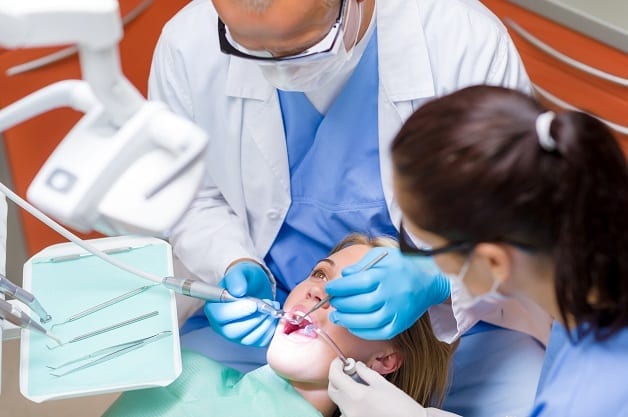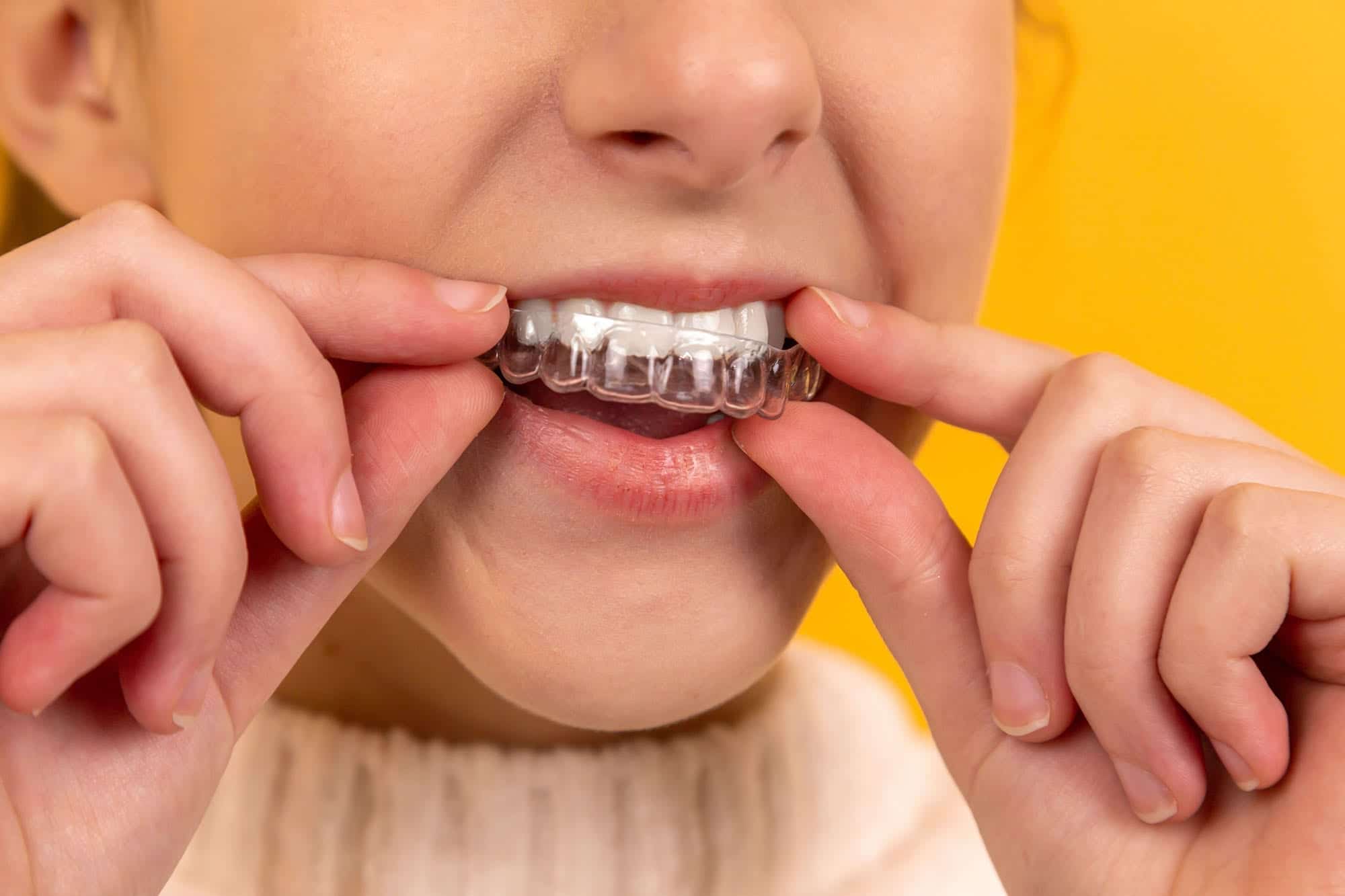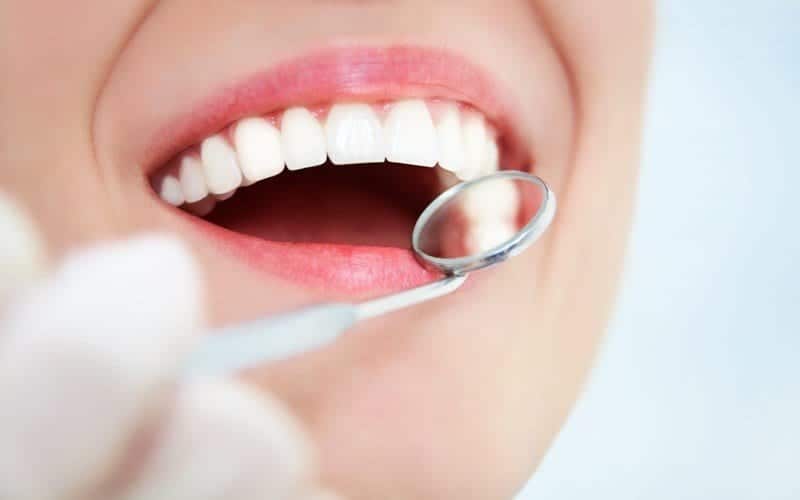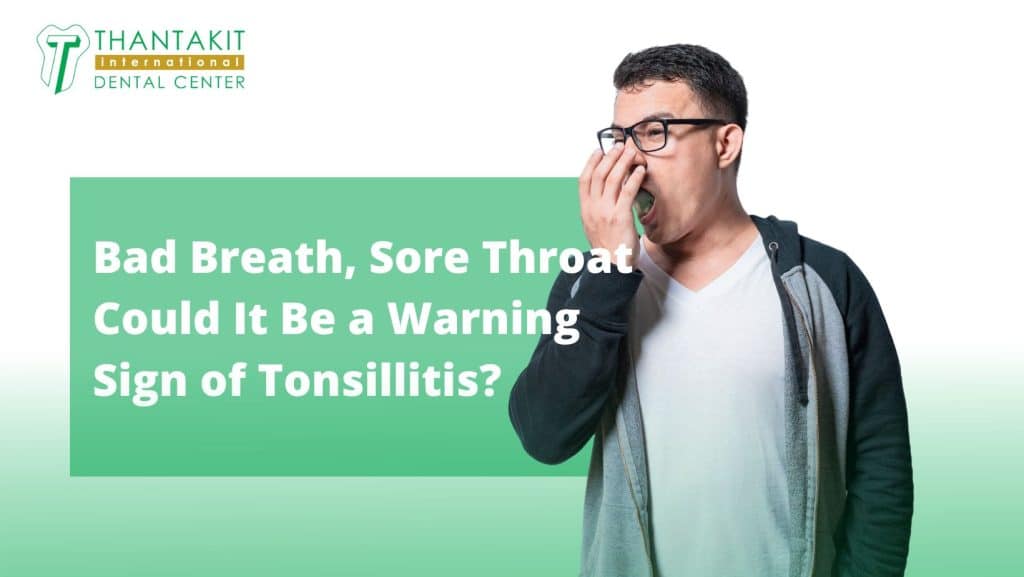Two of the warning signs of tonsillitis are bad breath and sore throat. It’s possible to have both these symptoms and not have tonsillitis, but it’s also true there’s a non-zero chance of you having tonsillitis as well.
In certain instances, halitosis (bad breath) comes from a buildup of bacteria in your mouth or even your tonsils.
As these germs attack the tissues of your tonsils, they generate volatile sulfuric compounds (VSCs) as their waste products. VSCs linked the most to halitosis include the following.
-
Dimethyl sulfide
-
Hydrogen sulfide
-
Methyl mercaptan
Page Contents
The Reason for Tonsillitis’s Bad Smell
When the mucous membranes around the tonsils become inflamed due to a bacterial infection, this can result in a nasty smell.
Tonsil tissues that have an infection can also generate pus composed of bacteria and dead white blood cells.
Active infections commonly include pus as a symptom. It also stinks because of the bacterial waste products and decomposed tissue contained within the swollen and infected tonsils.
Food waste may also be carried by your tonsils because they’ve ended up lodged inside tiny grooves (tonsillar crypts) within and around your tonsils.
Tonsilloliths or tonsil stones can develop as a result of the accumulation in the tonsillar crypts. The smell of infected tissues is caused by a combination of bacteria, food particles, and heat-induced chemical reactions.
Describing the Smell of Tonsillitis
Halitosis from tonsillitis or the smell of bad breath caused by the disease may differ from bad breath caused by eating something odorous or by neglecting to brush your teeth. In short, tonsillitis-based halitosis is much worse.
Tonsillitis causes foul, “richer”-smelling bad breath due to the presence of bacteria, volatile sulfur compounds, and decomposing matter.
Some people might say that it smells like the following:
-
Sulfur
-
Rotten eggs
-
Rotten cabbage
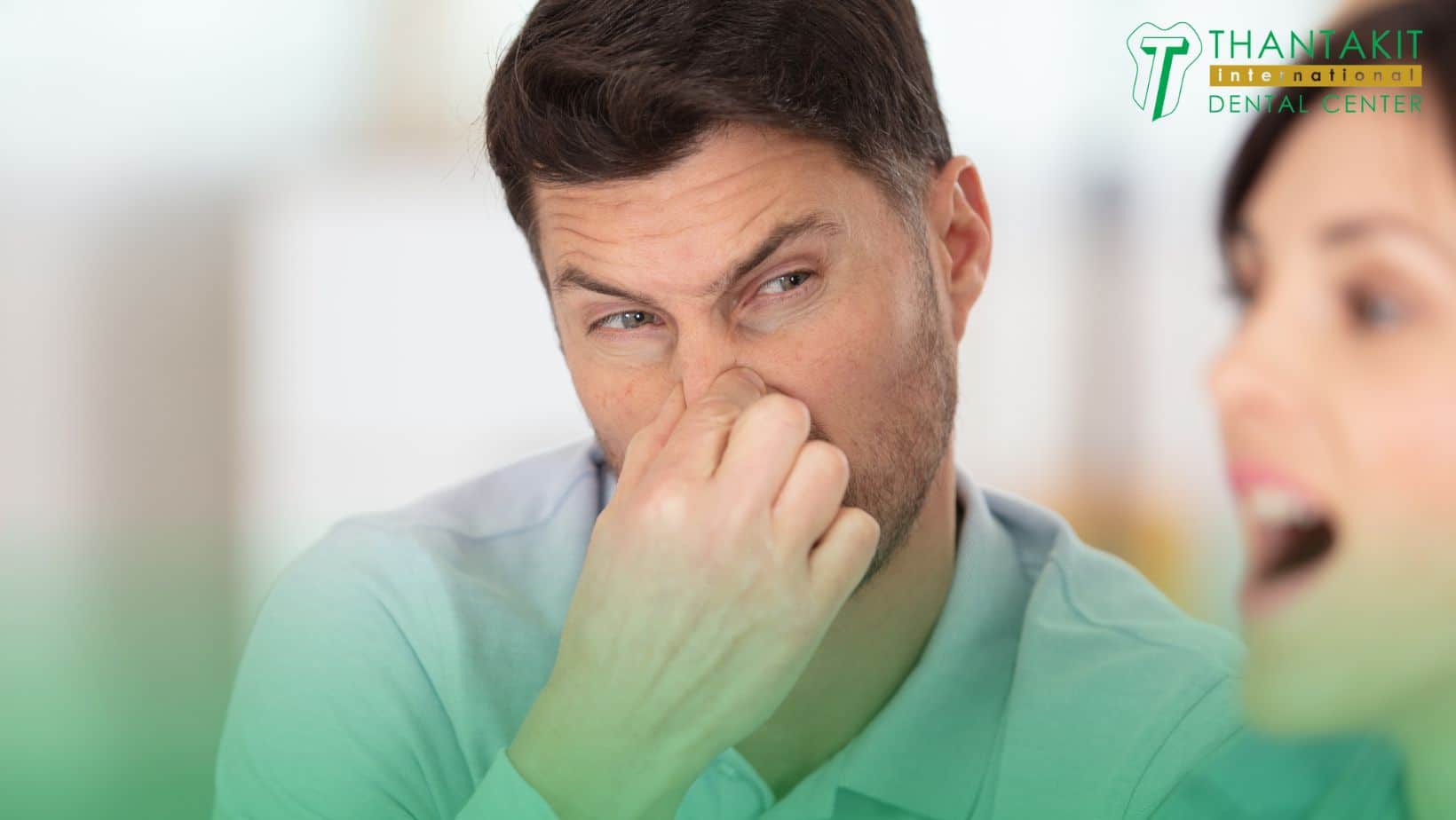
The Other Tonsillitis Symptoms to Watch Out For
One of the most obvious tonsillitis symptoms is bad breath. However, it has other symptoms to watch out for. The presence of these other signs and symptoms should confirm whether you do have tonsillitis or not. They include the following.
-
Chills
-
Fever
-
Earache
-
Headache
-
Sore throat
-
Hoarse voice
-
Stomach pain
-
Neck stiffness
-
Trouble swallowing
-
Swollen lymph nodes
-
Tonsils that appear red and swollen
-
Yellow or white spots on your tonsils
-
Tenderness of the jaw or neck due to swollen lymph nodes
When Should You Get Medical Assistance?
You should err on the side of caution and schedule a doctor’s appointment if you suspect you have tonsillitis. Get immediate medical help if you notice these serious symptoms along with aching, swollen tonsils:
-
Muscle weakness
-
Fever above 103°F (39.5°C)
-
Sore throat that lasts for more than two days
-
Stiff neck that doesn’t resolve itself with rest or sleep
Stopping Halitosis Rooting from Tonsillitis
Without treatment, tonsillitis frequently goes away along with bad breath. However, even after receiving treatment for the condition, your halitosis might linger for a few days or weeks following the resolution of the original infection.
Here are a few tips for lessening tonsillitis-related halitosis when push comes to shove.
-
Gargling: Use warm, clean water mixed with a pinch of salt for gargling a few times daily while you have tonsillitis. Alternatively, gargle with mouthwash and follow the directions on the bottle for gargling.
This assists in buildup removal. It also loosens tonsil stones while rinsing off infected areas at the same time, thus leading to bacterial reduction when push comes to shove.
When choosing mouthwash for gargling, buy one that’s an antiseptic solution or with ingredients like eucalyptus or alcohol.
This helps kill bacteria within your throat while simultaneously assisting in helping freshen up your bad breath.
-
Medicinal Treatment: You might be prescribed antibiotics by your doctor or dentist in case you’re dealing with a serious systemic bacterial infection that causes severe pain such as long-term tonsillitis or Streptococcus.
Antibiotics assist in the treatment of the underlying cause of your halitosis, thus your symptoms are addressed and reduced severely.
Prescribing antibiotics isn’t something doctors or dentists take lightly, and they usually won’t use it as a first line of treatment. They wish to limit antibiotic resistance risk and avoid side effects that are usually worse than halitosis.
Make sure to finish your entire course of antibiotics when they’re prescribed for you to avoid helping bacteria build up antibiotic resistance.
If a viral infection is the cause of your tonsillitis, your healthcare provider might suggest antiviral drugs instead. However, these infections can also go away on their own without any help from your own immune system—assuming that it’s functioning well.
-
Tonsillectomy: If tonsillitis is something you get often, you might need to have your tonsils removed by a doctor. Tonsillectomy is the name of this procedure.
Doctors tend to suggest this treatment for children with tonsillitis who also have this throat infection regularly, such as:
-
Seven times in the past year.
-
Five times yearly for two years.
-
Three times yearly for three years.
A pediatric tonsillectomy may also be recommended by a physician in other circumstances. Although there are no formal guidelines for tonsillectomy in adults, doctors occasionally use the same standards.
After they’re removed, your chances of developing tonsillitis will be eliminated, which may lessen the occurrence of halitosis.
If you’ve experienced chronic swelling or inflammation, it may also improve your ability to swallow or breathe.
You may still end up getting pharyngitis or strep throat, two more infections that can lead to foul-smelling breath. However, these usually subside after tonsillectomy as well.
-
Cryptolysis: Tonsillar crypts can be reduced or removed with a procedure called cryptolysis, which is more common outside of the U.S. Tonsillar crypt removal can help spare your tonsils from a tonsillectomy.
In order to help prevent food and other materials from becoming stuck in these tiny spaces, a doctor may choose to do this procedure rather than electing you to undergo an outright tonsillectomy.
Inside the tonsillar crypts, food particles, mucus, or postnasal drip can get trapped and cause bad breath, which can be prevented with cryptolysis treatment.

Can The Tonsils Be Cleaned at Home?
You can keep your tonsils nice and clean as well as germ-free through several ways, which includes the following:
-
Humidifiers
-
Honey and warm tea
-
Licorice chewing gum
-
Ice chips and popsicles
-
Routine gargles with salt water
-
Clearing tonsil stones with coughing
-
Drinking apple cider vinegar or gargling with it
-
Consuming yogurt and other probiotic-rich foods
-
Using a Waterpik to remove debris or tonsil stones
-
Using diluted essential oils, like lemongrass or myrrh, to brush your teeth
The Causes of Halitosis in Children
Is the foul breath coming from your child literally leaving you in tears and affecting their social life? Perhaps they should change their dental hygiene regimen.
Even frequent brushing and flossing, however, may not always be enough to mask the bad odor emanating from his mouth. Find out what causes halitosis or bad breath in children.
Should you go for a tonsillectomy or is it a hygiene issue? Decide what to do next after learning the truth.
-
Poor Oral Hygiene: First, observe how they brush their teeth. Frequent brushing and flossing remove plaque and food debris, both of which can lead to unpleasant odors.
Yes. Ironically, brushing can lead to bad breath if done haphazardly or in an incomplete manner.
These leftover bacteria can accumulate and cause gum irritation, tooth decay, and halitosis, to name a few problems. Gum disease, mouth sores, cavities, and other oral infections can release an unpleasant odor too.
The odor can be difficult to get rid of with regular brushing. Make sure you’re regularly take your child to the dentist for examinations and professional cleanings.
-
Diet and Nutrition: There are times when microbial activity has nothing to do with your child’s foul breath. Strong spices, garlic, onions, and other foods and vegetables can give off an unpleasant odor.
Among adults, a common cause of halitosis is drinking alcohol and/or smoking tobacco. With children, it’s more about their food consumption.
Odiferous molecules enter the bloodstream during your child’s digestion and absorption of these foods, and they are subsequently progressively expelled through breathing and the lungs.
Foods high in protein, such as fish, cheese, and red meat can even worsen halitosis. If your child’s breath starts to smell bad, you might want to restrict some of these foul-smelling foods.
-
Infections and Diseases: Tonsillitis is just one of many other infections and diseases that can cause bad breath. Your child’s bad breath may have another origin if you and your dentist are satisfied with their oral hygiene regimen.
Additionally, halitosis can be a sign of a number of illnesses and infections. Among them are:
-
Sinus Infections: Bacteria love to congregate in the nasal passages and throat where fluid accumulates due to sinus problems. The result? Halitosis is resistant to treatment with mouthwash and a toothbrush alone.
Call your doctor to schedule an appointment and discuss treatment options if you think you may have a sinus infection that could be causing symptoms like post-nasal drip, burning nasal passages, and sore throat.
-
Swollen Tonsils: Tonsillitis, as discussed at length above, can also be a culprit for your bad breath. There are levels of severity to tonsillitis though. Some levels are more treatable than the others.
Take a peek inside your child’s mouth with a flashlight to see how their tonsils appear. Infected tonsils are red, swollen, sometimes have white spots, and smell awful.
Healthy tonsils should be pink and spotless. Bad breath can be caused by bacteria that grow inside the pits of swollen tonsils and combine with the sickly smell of an infection.
Your child’s pediatrician or dentist should examine and prescribe treatment if their tonsils appear swollen or red.
-
Various Other Diseases: Various other diseases such as mouth cancer, liver problems, stomach infections, kidney failure, and diabetes could cause halitosis.
Children’s bad breath has also been linked to these less common or grave conditions that honestly plague adults more than children.
There is also evidence that fungal infections can cause halitosis in children receiving chemotherapy for cancer. Halitosis treatment will depend on the systemic treatment of the disease in question.
Consult your physician and dentist about potential treatments for bad breath if you’re aware that your child suffers from any of these ailments.
-
Foreign Objects: The answer may surprise you if you’re still wondering why your child or toddler’s breath smells terrible. Something lodged in your child’s nasal passages may be the cause of their foul breath.
Children are naturally inquisitive, and their nostrils are the ideal size for squeezing tiny objects like food, beads, and beanbags.
These items have the potential to cause an unpleasant-smelling infection in children if they become stuck in their nasal passages.
You’ll need a doctor’s assistance to examine your child’s nasal passages and remove the object if you think this is the cause of their foul breath. Get dentist center or hospital assistance ASAP in case of such emergencies.
-
Mouth Breathing or Dry Mouth: Children can get dry mouth from finger-sucking, pacifier usage, certain medication side effects, and general dehydration. Similarly, at night, mouth breathing or snoring can cause their saliva to evaporate.
In addition to being crucial in eliminating bacteria that cause odors, saliva also prevents cavities and tooth decay. Your child can run out of saliva by not drinking enough water as well.
In addition to making sure your child drinks enough water each day. You should also discuss dry mouth prevention with your dentist. Preventing dry mouth and dehydration can alleviate halitosis risk significantly.

How to Treat Halitosis in Children
Preventing halitosis starts with a strong oral hygiene regimen. Follow the following tips and recommendations below that come straight from the American Dental Association (ADA).
-
Clean the Tongue: Make sure they clean their tongue after brushing their teeth, as it can easily harbor bacteria that causes halitosis.
-
Toothpaste Portioning: For kids under three, use a rice-sized dollop of toothpaste. For older kids, use a pea-sized dollop. Make sure they spit and do not swallow out the toothpaste.
-
Routine Dentist Appointments: As soon as your child gets their first tooth, make an appointment for routine examinations and cleanings with the dentist to catch any issues with oral hygiene early on.
-
Floss Daily: Have kids floss daily to keep the space between their teeth clean as soon as two of them are in contact. By doing this, you can eliminate food particles that cause odors and avoid plaque buildup.
-
Two Minutes of Adult-Assisted Brushing: Make sure your child spends two minutes brushing their teeth twice a day. Until you’re sure that your child can brush their teeth correctly on their own, you will need to watch over them or assist them.
Chronic Halitosis in Children
The dentist may refer you to a primary care physician for further testing to identify the underlying cause of the halitosis if your child’s mouth appears healthy, but your bad breath persists.
This is especially true of persistent halitosis despite the child’s improvement of his oral hygiene practices. Whatever the reason, you can help your kids form lifelong dental hygiene habits by teaching them the correct techniques for brushing and flossing their teeth.
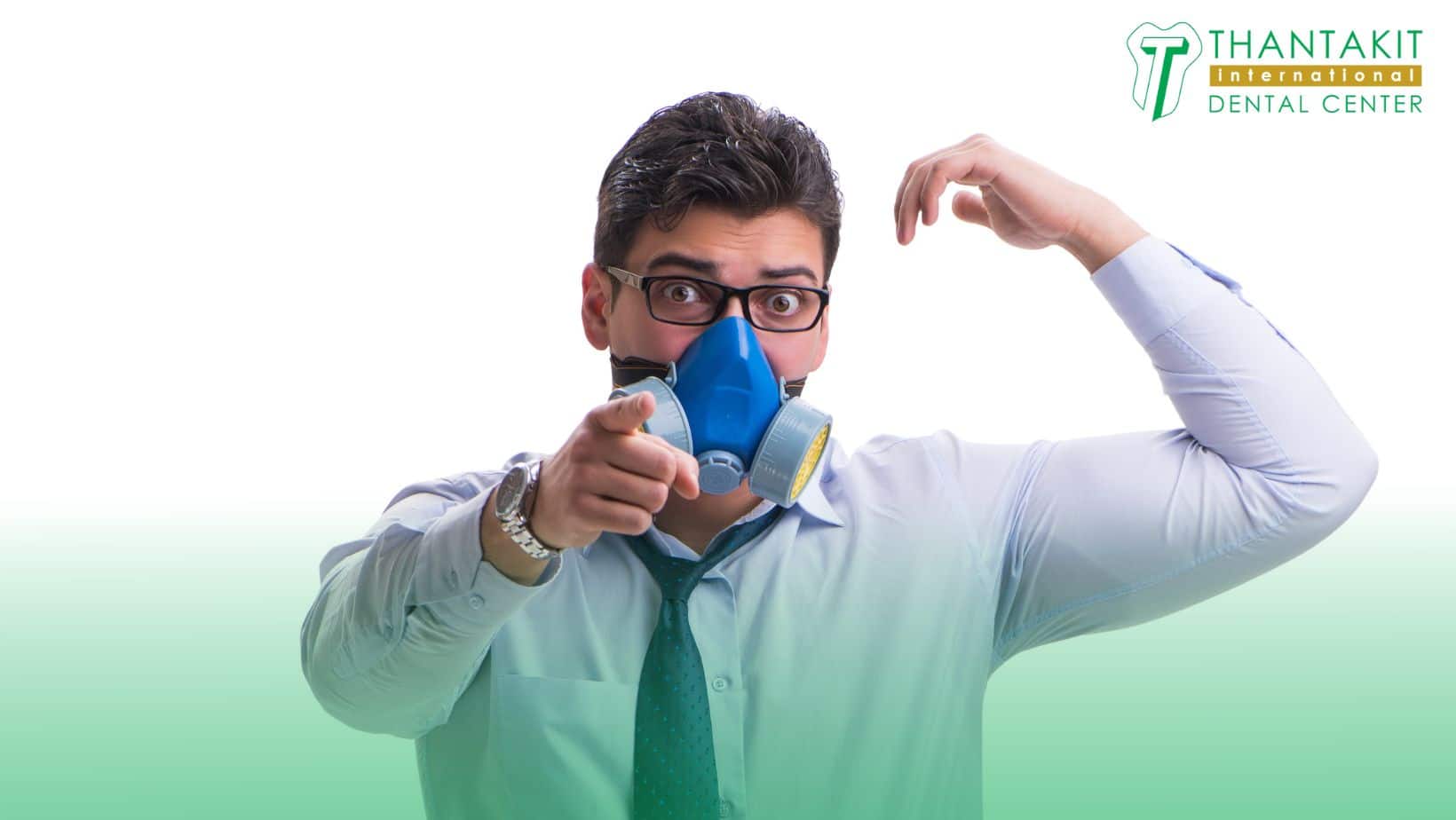
Look for Dental Help That You Can Trust
Due to infections of the mucous membranes surrounding the tonsils and pus production, tonsillitis frequently results in bad breath. Bad breath can also be caused by tonsil stones or materials lodged in tonsillar crypts.
To lower the risk of tonsil infections and tonsil stones, try to take preventive steps at home. However, if you have a painful sore throat that lasts longer than a few days or keeps coming back, make sure to get medical attention.
Finally, if you’re looking for affordable professional dental services—including (but not limited to) orthodontics, prosthodontics, and cosmetic dentistry—just consult the dental experts at the Thantakit Dental Center through a low-cost dental tour in Thailand.
Thantakit International Dental Center is Thailand’s longest established dental center. Situated in Bangkok, our clinic is renowned across the world as a destination for world-class dentistry, with most of our patients flying to us from Australia.
Please contact us today and get a FREE dental consultation.



